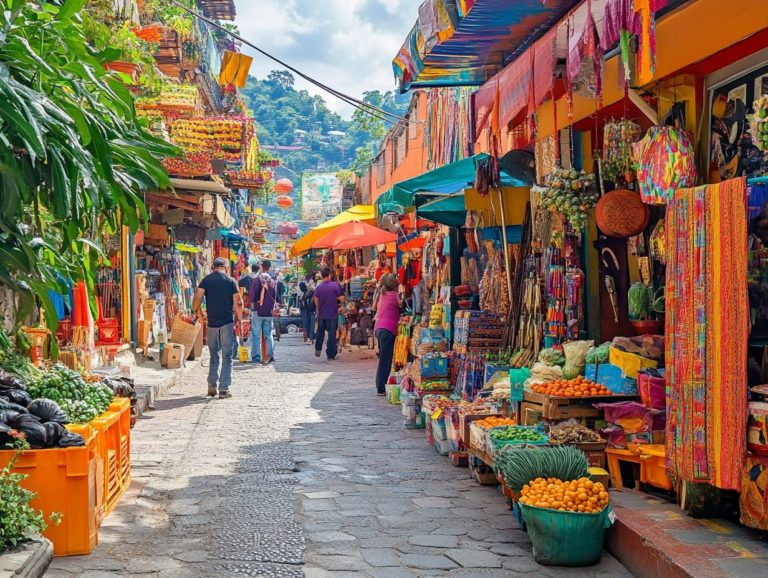How to Avoid Travel Scams Abroad
Traveling can be an exhilarating experience, but it s not without its risks, particularly when it comes to scams. From counterfeit tour guides to misleading accommodation offers, grasping the various types of travel scams is crucial for any savvy traveler like yourself. This guide highlights the red flags you need to spot, equips you with tips on how to conduct thorough research on your destination, and offers practical advice for safeguarding your belongings. Stay alert! Knowing the latest scams can make the difference between a great trip and a disaster.
Contents
- Key Takeaways:
- Understanding Travel Scams
- Researching Your Destination
- Protecting Your Belongings
- Staying Alert and Aware
- Avoiding Common Scams
- Frequently Asked Questions
- What are some common travel scams to watch out for abroad?
- How can I avoid falling for a travel scam abroad?
- Are there any specific safety measures I should take to avoid travel scams abroad?
- What should I do if I do fall victim to a travel scam abroad?
- How can I spot a fake travel agency or tour guide abroad?
- Is it safe to use public Wi-Fi while traveling abroad?
Key Takeaways:

- Be informed about common travel scams and how they work to better protect yourself when traveling abroad.
- Do your research on your destination to identify common scams, so you can be prepared and avoid falling victim to them.
- Protect your belongings and stay alert and aware of your surroundings to avoid being targeted by scammers.
Understanding Travel Scams
Understanding travel scams is essential for every traveler, as these deceptive tactics can swiftly transform a dream vacation into an utter nightmare. Awareness is your best defense to safeguard your travel experience. The travel industry has witnessed a troubling rise in scams, often targeting unsuspecting tourists with aggressive tactics that demand personal information or wire transfers, potentially leading to identity theft.
This guide highlights the red flags you need to spot and equips you with practical strategies to protect yourself and your travel arrangements.
Types of Scams and How They Work
Travel scams come in various guises, each crafted with unique methods aimed at misleading you into losing both your hard-earned money and personal information:
- Fake Discounts: Enticing fake sweepstakes that promise lavish vacation deals, but then hit you with upfront booking fees or wire transfers just to claim what seems like a prize.
- Phishing Scams: Unauthorized charges sneaking in while you re booking travel accommodations, often luring you in through phishing emails or hidden fees from fake online ads.
- Counterfeit Websites: Scammers create websites that mimic legitimate travel agencies, tricking you into divulging sensitive credit card information.
Scammers are experts at applying aggressive sales tactics during phone calls or face-to-face encounters, generating a sense of urgency that can lead to hasty, ill-considered decisions. It s imperative for you to remain vigilant and seek out reviews and third-party verification before committing to anything. This diligence will help ensure that your travel experiences are not only enjoyable but also secure.
Researching Your Destination
Researching your destination is a crucial step in ensuring a safe and enjoyable travel experience, especially in an era filled with potential travel scams. By leveraging reputable websites and consulting with a travel advisor, you can gain valuable insights into local customs, safety tips, and the common scams that might pop up in that area. Familiarizing yourself with the necessary travel documents is also important, ensuring your rights as a traveler are well safeguarded.
Equip yourself with knowledge and travel smart!
Identifying Common Scams in Your Destination

Identifying common scams in your destination can save you both time and money, paving the way for a more enjoyable travel experience. As a traveler, it’s essential to be on the lookout for red flags like deals that seem too good to be true or vacation rentals insisting on unusual payment methods, especially if they ask for wire transfers or prepaid cards.
Knowing whether you need an international driving permit can also help you avoid potential pitfalls when renting vehicles abroad.
Staying vigilant is crucial, particularly when sifting through online ads for vacation rentals that boast stunning images but lack genuine reviews. If a listing features a luxurious property at an astonishingly low price, dig deeper. Scammers often craft fake listings to entice travelers into making hefty down payments.
Always verify listings or seek recommendations from trusted sources. Be wary of landlords who pressure you into immediate bookings without giving you time to ask questions; this could signal a potential scam. Spotting these signs can transform your travel experience into a safer adventure.
Protecting Your Belongings
Protecting your belongings while traveling is essential for a truly stress-free experience, especially when faced with the looming threat of travel scams. Invest in travel insurance for a safety net against unexpected events.
Use credit cards instead of cash for transactions to enhance the security of your personal information. Stay vigilant about pressure tactics used by scammers to maintain control over your financial decisions as you navigate your travels.
Tips for Keeping Your Valuables Safe
Keeping your valuables safe while traveling requires a blend of awareness and strategic planning to outsmart potential scams. One effective approach is to limit the personal information you share, particularly when booking accommodations online. Always opt for a credit card for transactions; they typically offer better consumer protection against fraud compared to other payment methods.
In addition to using credit cards, regularly monitor your bank accounts and credit card statements for any unauthorized charges. Monitoring your accounts helps you spot issues early and enables you to report problems promptly to your financial institutions.
When selecting where to stay, choose reputable hotels that provide secure storage options for your valuables, such as in-room safes or locked storage rooms.
Consider using anti-theft bags and wallets designed to deter pickpockets and protect against theft that uses radio signals to steal your credit card information without touching it. These measures protect you from theft and ensure you can explore new destinations with peace of mind.
Staying Alert and Aware
Remaining vigilant and aware during your travels is crucial to avoiding the pitfalls of travel scams and ensuring an enriching experience. Look for red flags, such as online advertisements that promise impossibly low prices or unsolicited vacation deals that demand immediate payment.
By recognizing the pressure tactics often employed by scammers, you can keep a discerning eye and make informed decisions, ultimately protecting yourself from unauthorized purchases.
Act quickly to protect your belongings. Every second counts when dealing with potential scams. Stay informed and keep your adventures enjoyable!
Signs to Look Out For and How to React

Recognizing travel scams is vital for every traveler. Understanding these signs allows you to react appropriately to potential threats. Look out for red flags like overly aggressive sales pitches, vague language in online ads, or urgent requests for unusual payment methods. Knowing your rights as a buyer helps you confidently decline suspicious offers.
Be wary of deals that sound too good to be true; they often are! This includes steep discounts on luxurious accommodations or highly coveted excursions that promise lavish experiences without reasonable explanations.
If a travel proposal lacks transparency or fails to provide verifiable company information, take these warning signs seriously. Prioritize thorough research, check travel review platforms, and seek recommendations from trusted friends or travel experts to ensure the legitimacy of your choices.
By staying informed and vigilant, you can effectively prevent falling victim to these deceitful schemes.
Avoiding Common Scams
Avoiding common travel scams demands a proactive mindset. Be cautious of excessively high booking fees or payment methods that require wire transfers these are often red flags signaling a scam.
Familiarizing yourself with potential travel fraud can significantly minimize your risk of becoming a victim of deceptive practices.
Specific Strategies for Avoiding Common Scams
Implementing specific strategies can greatly reduce your chances of falling victim to travel scams and protect your travel investment. Always prioritize reputable websites when booking accommodations or services. Consider consulting a travel advisor for expert insights. Securing comprehensive travel insurance serves as a financial safety net against potential losses due to scams.
It’s crucial to conduct thorough research on the risks specific to your destination. Websites dedicated to traveler reviews and forums offer real-time insights into issues others have faced, making them invaluable resources.
Familiarize yourself with common scam tactics in your travel areas; this knowledge will help you recognize and sidestep potential pitfalls. Remember, purchasing travel insurance not only covers cancellations but can also include emergency medical services, giving you peace of mind during your journey.
Stay informed and cautious to make your travel experience safer and more enjoyable.
Frequently Asked Questions
What are some common travel scams to watch out for abroad?

Some common travel scams to watch out for abroad include fake police officers, taxi scams, and fake tour guides.
How can I avoid falling for a travel scam abroad?
To avoid falling for a travel scam abroad, do research on your destination beforehand, be cautious of strangers offering deals or asking for personal information, and trust your instincts. Familiarizing yourself with the most common travel scams can also help you stay safe.
Are there any specific safety measures I should take to avoid travel scams abroad?
Yes, some safety measures include keeping your valuables close and secure, avoiding displaying large amounts of cash, and being aware of your surroundings at all times.
What should I do if I do fall victim to a travel scam abroad?
If you do fall victim to a travel scam abroad, report it to local authorities and your embassy, cancel any compromised credit or debit cards, and seek help from trusted sources such as your hotel or a tourist information center.
How can I spot a fake travel agency or tour guide abroad?
To spot a fake travel agency or tour guide abroad, research the company or individual beforehand, ask for credentials and references, and be cautious of deals that seem too good to be true.
Is it safe to use public Wi-Fi while traveling abroad?
Avoid public Wi-Fi when traveling abroad. It can expose you to hackers and scammers.
Keep your online activities safe while traveling! Use a virtual private network (VPN) for safer browsing. Stick to trusted networks like those offered by your hotel or a known caf .






